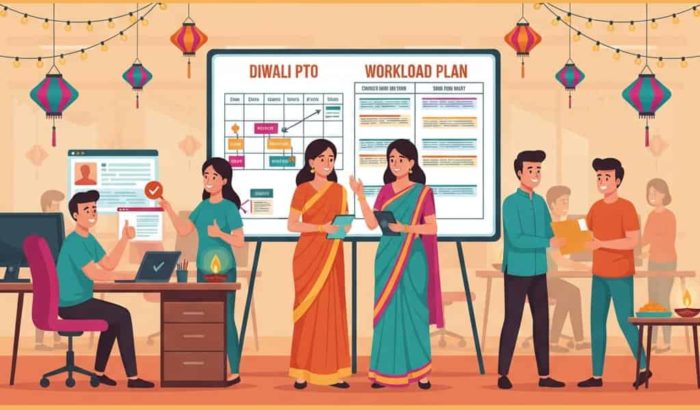There’s a special kind of buzz in the air when Diwali rolls around-the glow of diyas, the smell of sweets, and the nonstop chatter about who’s taking time off and who’s bringing the best mithai to the office. It’s a time when even spreadsheets seem to sparkle a little.
But here’s the real talk: while everyone’s ready to celebrate, HR and team leads often find themselves juggling between keeping the festive spirit alive and making sure deadlines don’t vanish into a cloud of fireworks. Striking that balance between respecting cultural traditions at work and maintaining productivity during the festive season isn’t about being strict-it’s about being smart, empathetic, and intentional.
This blog dives into how Diwali in the workplace can be both joyful and productive. From HR tips for Diwali celebrations to inclusive workplace culture ideas, we’ll explore how companies can make workplace Diwali celebrations meaningful while ensuring the team stays engaged, motivated, and on track.
Celebrating Diwali Without Derailing Work
Workplace Diwali celebrations can get a little chaotic. Between planning potlucks, decorating desks, and organizing virtual games, it’s easy for productivity to take a quick holiday of its own. But celebrating doesn’t have to mean slowing down.
A well-thought-out Diwali office celebration can actually boost morale and motivation. HR teams can plan short, focused activities during lunch breaks or end-of-day hours, so work still gets done while everyone enjoys the festive vibes. Think “snack-and-chat” sessions, themed Zoom backgrounds for remote teams, or even a five-minute diya-lighting ceremony. These little touches bring people together without derailing deadlines.
For managers, this is also a great time to show empathy. Encourage flexible schedules where possible-because if someone’s heading home early to help with decorations or family prayers, a bit of understanding goes a long way. By blending flexibility with accountability, companies can maintain productivity during the festive season while

HR and Team Strategies for Managing Workloads During Diwali
Festive energy is contagious, but so are missed deadlines if teams don’t plan ahead. Diwali can bring joy, bonding, and renewed motivation-but it also comes with time-off requests, shorter weeks, and a dip in focus. For HR teams and managers, balancing Diwali in the workplace while maintaining workflow is all about foresight, flexibility, and clear communication.
Plan Ahead-Because Diwali Isn’t a Surprise
The first rule of managing productivity during the festive season is simple: don’t wait till the last week of Diwali to figure it out. Create a short festive calendar outlining key project timelines, team availability, and overlapping holidays.
Encourage employees to apply for leave early so that managers can plan around it. HR can use automated tools like AttendanceBot to track who’s off and when, helping avoid last-minute confusion. This proactive approach ensures every department stays covered without overwhelming anyone.
Prioritize and Delegate Smartly
Not every task is urgent, and not every meeting needs to happen before Diwali. Encourage teams to identify what truly needs attention before the holidays and what can wait until after.
Managers can delegate responsibilities across team members to spread out the workload evenly. This creates a sense of ownership and teamwork-two things that thrive during workplace Diwali celebrations. When employees feel trusted to manage tasks independently, they’re more likely to stay productive and motivated.
Introduce Flexible Schedules and Shorter Workdays
Flexibility can be a game-changer during festive weeks. Allowing employees to start earlier or leave a bit sooner can help them balance personal commitments without affecting overall output. For remote or hybrid setups, offering asynchronous work options lets people manage their energy levels better while keeping the workflow moving.
This small act of trust signals that leaders value employee engagement during Diwali, not micromanagement. The outcome? Happier employees who still deliver.
Encourage Mindful Productivity
Festive excitement can make it hard to focus, and that’s okay-it’s part of being human. HR can remind teams to pace their work and take short breaks to recharge. A simple “no meetings afternoon” before Diwali can help employees wrap up pending tasks or clear mental space for the week ahead.
Managers can also promote well-being by reminding everyone that it’s fine to slow down a little as long as priorities stay on track. Mindful productivity during Diwali fosters both performance and well-being.
Keep the Communication Flowing
When things get busy, communication can make or break productivity. HR teams can send out a cheerful yet informative message about office hours, deadlines, and holiday policies during the Diwali office celebration week.
Regular check-ins-without being intrusive-help managers catch potential bottlenecks early. Whether through Slack, Teams, or an in-person huddle, staying connected ensures that everyone feels supported, not pressured.
Appreciate the Extra Effort
Lastly, don’t forget recognition. Employees who go the extra mile to keep things running smoothly deserve appreciation. A quick shout-out on Slack or a small thank-you gift can make a big difference.
Acknowledging effort reinforces an inclusive workplace culture where celebrations and performance go hand in hand. It’s a reminder that Diwali at work isn’t just about lights and sweets-it’s about teamwork, empathy, and balance.
Use Technology to Stay Organized
When work and festivities overlap, automation becomes every HR manager’s best friend. Tools like AttendanceBot or task trackers within Slack and Microsoft Teams can help manage time-off requests, shift swaps, and project visibility all in one place.
For teams working across different locations, digital dashboards and shared calendars can make sure everyone knows what’s due and who’s available. These small systems prevent confusion and allow employees to enjoy the workplace Diwali celebration without stress.
Think of it as using tech to do the heavy lifting-so people can focus on lighting diyas, not juggling spreadsheets.
Build Buffer Time into Project Plans
Even with great planning, there’s always that last-minute bug, client feedback loop, or “quick” meeting that stretches longer than expected. HR and team leads can help by encouraging managers to add buffer time to project plans during the Diwali in the workplace period.
That extra half-day or one-day cushion can save teams from working late or compromising on quality. It’s one of those invisible strategies that make the festive week flow smoothly.
Buffering doesn’t mean expecting less-it means expecting realistically, especially when employees are balancing both work and family festivities.
Foster Open Conversations About Workload
The festive season can bring both excitement and pressure. HR should create space for employees to talk openly about workloads, burnout, or scheduling conflicts. A simple weekly check-in can make a world of difference.
Encouraging honest communication reinforces respecting cultural traditions at work, because it acknowledges that employees have different priorities during Diwali-some may want time off, others might prefer quieter workdays. Listening without judgment helps HR design fair, inclusive, and balanced policies.
Keep Morale High With Small Gestures
Festivities are the perfect excuse to spread some joy around the office (or Slack channel). Send out appreciation notes, deliver a box of sweets, or announce a “no meetings Friday” before Diwali.
Even small gestures like recognizing a team’s effort in a newsletter or Slack shout-out can make employees feel valued. These little things keep employee engagement high during Diwali, even when workloads are heavy. After all, a motivated team will always perform better than an overworked one.
Create a Mini “Post-Diwali Reset”
The week after Diwali can be tough-sugar crashes are real, and inboxes tend to overflow. HR can plan a soft landing back into work by organizing a quick team sync-up or a casual coffee chat on the first day back.
This not only helps people reconnect but also sets a positive tone for the weeks ahead. It’s a great way to transition from celebration mode to focus mode without losing that festive warmth.
By blending thoughtful planning with empathy, HR teams can ensure that Diwali in the workplace remains a source of joy, not chaos. Because at the end of the day, productivity isn’t about working harder-it’s about working happier.

Beyond the Festivities: Rethinking Balance and Belonging
Diwali isn’t just about celebration-it’s a moment for workplaces to pause, reflect, and reset. For HR and leaders, it’s the perfect time to look at how teams can carry the same light and balance through the rest of the year.
Make Space for Rest and Reflection
While everyone talks about productivity, few talk about rest. Festivals like Diwali remind us that stepping back can actually help us move forward with clarity. HR teams can use this time to promote mindful productivity-encouraging employees to recharge without guilt.
Think of this as a mental spring-cleaning moment: close the quarter with gratitude, clear backlogs, and start afresh. By weaving small reflection rituals into company culture-like gratitude circles or end-of-month wrap-ups-organizations can build sustainable momentum that lasts beyond the festive season.
Reinforce Values Through Festive Moments
Every organization has a set of values printed somewhere-but Diwali gives leaders a chance to live them. Whether it’s teamwork, respect, or empathy, these values come alive when practiced in real situations like workplace Diwali celebrations.
Use this time to reinforce what your culture stands for. Highlight stories of collaboration, kindness, or innovation. It’s not about grand speeches-it’s about creating a shared sense of pride and belonging that employees carry with them long after the diyas fade.
Make Inclusivity a Year-Round Practice
Celebrating Diwali in the workplace is wonderful-but true inclusion means celebrating everyone’s culture throughout the year. HR teams can build on the Diwali spirit by planning a “culture calendar” that honors different festivals and observances across the team’s diverse backgrounds.
From Lunar New Year to Thanksgiving to Eid, giving space to every tradition fosters respect, empathy, and cultural diversity at work. It shows employees that inclusion isn’t a checkbox-it’s who the company is, every single day.
Lighting the Way to a Balanced Workplace
At its core, Diwali in the workplace is about more than lights and laddoos-it’s about recognizing people, their traditions, and the shared energy that keeps teams thriving. When organizations approach Diwali with empathy and structure, they don’t just manage a festive week-they nurture a culture where everyone feels valued and seen.
For HR teams, this season is also a reminder that balance doesn’t happen by accident-it’s planned with intention. Tools like AttendanceBot can make this smoother by helping track time-off requests, flexible schedules, and shift changes right within Slack or Microsoft Teams. That way, celebrations stay joyful and workflows stay seamless.
As diyas light up homes and workspaces alike, may this Diwali inspire more mindful workplaces-where productivity and positivity go hand in hand, and culture isn’t an afterthought but a daily practice.
Happy Diwali to all! 🌼✨



